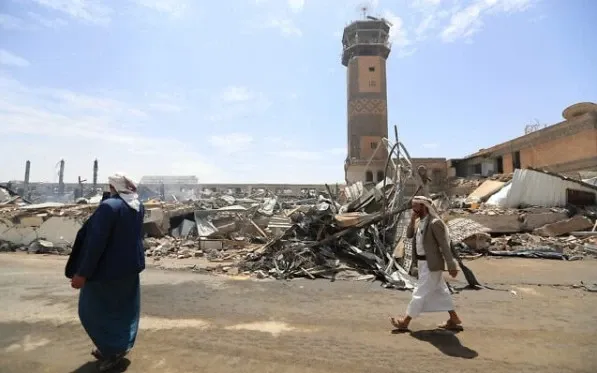Is Yemen's Sanaa airport back in action after Israeli airstrikes?

Synopsis
Key Takeaways
- Sanaa International Airport has resumed operations after Israeli airstrikes.
- First UN flight arrived today, with more scheduled.
- The airport is crucial for humanitarian efforts in Yemen.
- Operations were suspended since May 7 due to the damage.
- The reopening follows a truce involving the US and Houthis.
Aden (Yemen), May 16 (NationPress) Sanaa International Airport, which had been rendered non-operational due to Israeli airstrikes earlier this month, has officially resumed its operations.
According to Khaled Al-Shaif, the airport's director, the first UN flight arrived this morning following its rehabilitation. He shared this update on the social media platform X.
Al-Shaif announced, "10 UN flights are scheduled to depart and arrive today, as the airport is now equipped to handle flights once more."
This announcement followed a visit from the Prime Minister, the first Deputy Prime Minister, and the Minister of Transport and Public Works, who inspected the damage inflicted by a series of Israeli airstrikes earlier this month, as reported by Xinhua news agency.
He added, "The technical and engineering teams have successfully completed the development work according to the established timetable, enabling the airport's operations to resume, which is crucial for Yemenis, particularly under the current circumstances."
Operations had been halted since May 7 due to the damage caused by Israeli strikes, following missile fire from the Yemeni Houthis that landed near Tel Aviv's Ben Gurion Airport in support of Palestinians in Gaza.
On May 6, Israeli warplanes conducted airstrikes on the airport controlled by the Houthi group, completely incapacitating the facility that serves as a vital lifeline for humanitarian efforts in Yemen.
In the aftermath of the airstrikes, Al-Shaif announced that all flights to and from the airport would be suspended until further notice.
The airport reopened to international flights after a six-year hiatus in 2022, reestablishing connections to Jordan's capital, Amman.
Yemenis requiring emergency medical treatment abroad have depended on this airport.
Just last week, the US declared it would cease its bombing campaign, which had notably intensified since mid-March, while the Houthis also agreed to halt attacks on ships to maintain freedom of navigation in the Red Sea. This truce was facilitated and confirmed by Oman.
However, the agreement did not address Israel, which the Iran-backed Houthis pledged to continue targeting as part of their pressure campaign supporting Palestinians in Gaza.
The Yemeni group claimed responsibility for a missile launched towards Israel, triggering air-raid sirens across multiple regions.
The Israeli military reported, "Following the sirens that rang out in several areas of Israel, a missile launched from Yemen was intercepted," after previously confirming the missile launch towards Israeli territory.
On Friday, the Israeli army announced it had intercepted another missile from the Houthis, with Defence Minister Israel Katz promising a response.
Following this, the Israeli military issued a warning for Yemenis to evacuate three ports in Houthi-controlled territories.
The Houthi Interior Ministry reported Israeli strikes after this warning for residents of Ras Isa, Hodeidah, and Salif, with no comments from Israel.










